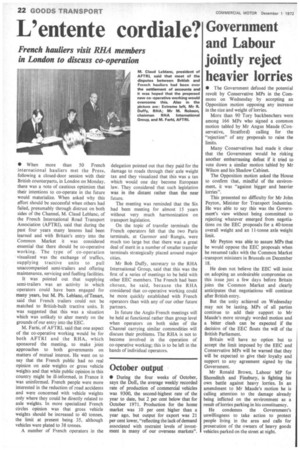L' entente cordiale?
Page 24

If you've noticed an error in this article please click here to report it so we can fix it.
French hauliers visit MIA members in London to discuss co-operation
• When more than 50 French international hauliers met the Press, following a closed-door session with their British counterparts, in London on Monday, there was a note of cautious optimism that their intentions to co-operate in the future would materialize. When asked why this effort should be successful when others had failed, presumably through distrust on both sides of the Channel, M. Claud Leblanc, of the French International Road Transport Association (AFTRI), said that during the past four years many lessons had been learned and with Britain's entry into the Common Market it was considered essential that there should be co-operative working. The type of co-operation visualized was the exchange of traffics, supplying tractive units to pull unaccompanied semi-trailers and offering maintenance, servicing and fuelling facilities.
It was pointed out that supplying semi-trailers was an activity in which operators could have been engaged for many years, but M. Ph. Leblanc, of Tenart, said that French trailers could not be matched to British-built tractive units. It was suggested that this was a situation which was unlikely to alter merely on the grounds of our entry into the EEC.
M. Farni, of AFTRI, said that one aspect of the co-operative working would be for both AFTRI and the RHA, which sponsored the meeting, to make joint approaches to both governments on matters of mutual interest. He went on to say that the French public had no real opinion on axle weights or gross vehicle weights and that while public opinion in this country might be ill-informed, in France it was uninformed. French people were more interested in the reduction of road accidents and were concerned with vehicle weights only where they could be directly related to axle weights. In more specialized French circles opinion was that gross vehicle weights should be increased to 40 tonnes, the limit at present being 35, although vehicles were plated to 38 tonnes.
A number of French operators in the delegation pointed out that they paid for the damage to roads through their axle weight tax and they visualized that this was a tax which would one day become European law. They considered that such legislation was in the distant rather than the near future.
The meeting was reminded that the Six had been meeting for almost 15 years without very much harmonization on transport legislation.
On the topic of transfer terminals the French operators felt that the two Paris terminals, at Garonor and Rungis, were much too large but that there was a great deal of merit in a number of smaller transfer terminals strategically placed around major cities.
Mr Bob Duffy, secretary to the RHA International Group, said that this was the first of a series of meetings to be held with other EEC members. The French had been chosen, he said, because the RHA considered that co-operative working could be more quickly established with French operators than with any of our other future partners.
In future the Anglo-French meetings will be held at functional rather than group level when operators on both sides of the Channel carrying similar commodities will discuss their problems. The RHA is not to become involved in the operation of co-operative working; this is to be left in the hands of individual operators.
































































































































